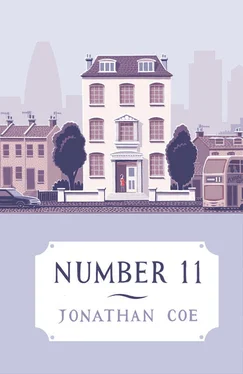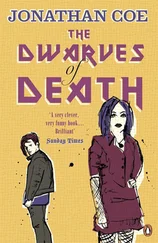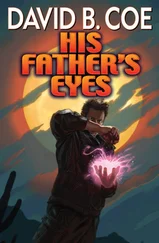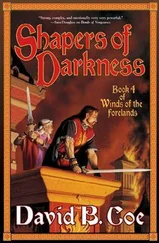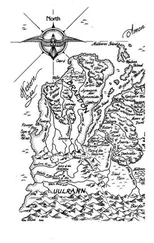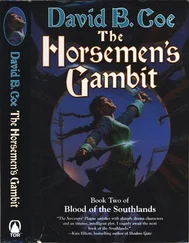‘Now, I don’t know exactly what James said to him to get him to cooperate. But, somehow or other, he persuaded Horst to let him look through the contents of the units. And as soon as he emailed Roger to let him know about this, Roger was on the first plane to Germany. He literally booked the first flight he could find that evening. I was sitting up in bed reading, last thing at night, when he came in and announced that he was off to Leipzig the next day. He had to get up at 3.30. I remember him giving me a goodbye kiss and saying something to me about the film — how sure he was that he was going to find it, how this was going to be the end of the search, how it would all be over and done with in a couple of days. I kissed him back and told him that I was glad. And that was the last time I ever saw him.’
She tried to drink from her wine glass, but it was empty again. Her eyes seemed tired now, almost sightless.
‘I’ll fetch James’s letter,’ she said. ‘That will tell you the end of the story.’
Rachel noticed that Laura was slightly unsteady on her feet as she got up and left the room. She went into the ground-floor study and was gone for a few minutes. Rachel heard desk drawers being opened and shut repeatedly, papers being shuffled through, multiple tuts of impatience and frustration. But at last the document was found, and Laura returned, bearing it aloft in one hand while she carried a small bottle in the other.
‘Brandy,’ she explained. ‘Always good to finish off the evening with a brandy. And here’s the letter. Have a read of that while I pour you a little shot of brandy.’
There was still a little wine left in Rachel’s glass, but the brandy was added to it anyway, producing a liquid that was sickly orange in colour. She refrained from drinking it, and concentrated instead on the sheaf of handwritten sheets which Laura had given her. The handwriting was clear and firm, with a noticeable italic slant. The notepaper itself was thick, creamy yellow and expensively watermarked.
My dear Laura [the letter began],
What a terrible thing it is to have to write these words. You said, at the funeral (and how beautifully you spoke to the congregation, on that wretched occasion), that I was not to blame myself for what happened. But how can I not? I was the one who led Roger to the place where he died. True, I could never have predicted what would happen there, but still — the fact remains. If it wasn’t for my intervention, your husband would be alive today.
Thursday was not the time to discuss the details of his last few hours. I promised you that I would write and tell you all that I could. So I shall begin at the time that I met Roger off the plane at Leipzig.
It was a bitterly cold morning. I met him at the airport (snow had delayed his connecting flight from Hannover by half an hour) and we went for a coffee at the airport bar. He did not waste any time in small talk — he came straight to the point and wanted to know everything about our forthcoming meeting with Horst. We had plenty of time but he made me gulp down my coffee and leave. As a consequence we arrived at the storage units about 15 minutes early. It was getting ever more snowy and although by now it was late in the morning, the sky was a thick grey-black and it felt like there would be no real daylight today. The storage place was simply a large warehouse on the outskirts of town: a place totally without character or atmosphere. There was a big car park outside. We parked the car and walked inside through the snow, and bought ourselves more scalding black coffee from the machine next to the reception desk. Then we sat there drinking it and waiting for Horst to arrive. I explained a thing or two to Roger: that it had not been easy, at first, to persuade Horst to let us look through these storage cupboards in search of Friedrich Güdemann’s effects. He was mistrustful of us. Until I had contacted him, he’d had no idea that Friedrich had had a career in film and television and the only reason he had agreed to meet us this morning, I was sure, was the possibility that we might be able to alert him to something among these belongings that was valuable and might be worth selling. I warned Roger that this might include the print of Der Garten aus Kristall , if we found it, but this suggestion did not seem to worry him, but only to excite him further. ‘You mean — you really think it might be here?’ he said, and that was his only reaction. He was so fixated on the idea of finding the film that he didn’t give a thought to what might happen to it afterwards, what kinds of dispute over ownership might arise. So powerful was his need, I now realize, to see it just once again, to relive — as best he could — those minutes of far-off enchantment he had enjoyed once, as a young and carefree schoolboy.
And what a desolate place that quest had brought him to. We were drinking our cheap, acrid coffee while sitting on a plain wooden bench, our backs to a wall. Our bench was at the centre of a pool of feeble neon light: all around us, the vast spaces of the warehouse stretched out into oceans of dense, impenetrable gloom. Corridors ran off in every direction, made up of row upon row of identical storage units, each one about four metres high and two wide. Above us were metal gantries, crossing and criss-crossing and leading to yet more storage units. I could imagine the echoing, metallic sound that footsteps might make if they pounded these walkways: but today, in reality, all was silent. A smothering and deathly silence. The only sound was the distant, sibilant trickle of music leaking out from the earphones of the guy sitting behind the reception desk. Roger and I spoke in low, murmurous undertones, as if we were in a cathedral or a library. Which I suppose we were, in a way. A library of unwanted possessions. A cathedral of the forgotten. In any case, we didn’t have much to say to each other.
There was no mistaking the sound of the car when it arrived, even with its tyres muffled by the snow. We both stood up and awaited Horst’s entrance. He was brushing the snow from his coat and was in a bad mood. Without saying hello to us he went to the reception desk and retrieved the keys to his two storage units. Only then did he come over and address us. I introduced Roger but he did not seem particularly interested. ‘You think there might be a film in one of these cupboards, right?’ he asked us. ‘You are looking for a film.’ I nodded and he said: ‘If we find it, you cannot have this film. It’s my property.’ I said of course, that was completely understood, and Roger said: ‘But we must see it. You must let us watch.’ Horst said something non-commital to the effect that he would think about that, and then we set off on our quest.
Horst’s units were on the ground floor of the warehouse. They stood directly opposite each other: one of them was Number 24, and the other was Number 11. The doors were painted yellow, and each one had a strong chunky padlock fitted to it. When Horst unlocked the door to Number 24 and threw it open, I peeped inside, and my heart sank. The cupboard looked much bigger than you would imagine from the outside, and it was packed from floor to ceiling with furniture and cardboard boxes. As for Number 11, it was even worse. The objects were stacked right to the very doorway, so that you could barely close the door and it was impossible to imagine what lay beyond the first stack. Sifting through all this jetsam, I realized at once, was going to be the work of many hours.
Well, I shall cut a long and difficult story short. Slowly and with great effort, we began to work our way through all the junk of Mr Güdemann, his sister and his brother-in-law. Roger and I looked through the contents of Number 11, while Horst concentrated on Number 24: he was looking for something specific, I could tell that, I expect he was hoping to find items of jewellery or something similar. We explained to him very carefully what a can of film would look like and he gruffly assured us that we would be told if he found one.
Читать дальше
